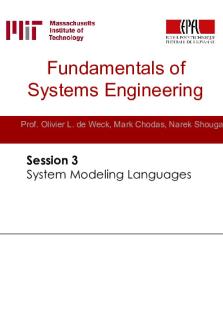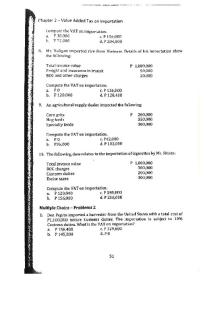Tutorial 3 - Lecture notes 3 PDF

| Title | Tutorial 3 - Lecture notes 3 |
|---|---|
| Author | Ayush Tyagi |
| Course | Family Law I |
| Institution | Guru Gobind Singh Indraprastha University |
| Pages | 5 |
| File Size | 147.5 KB |
| File Type | |
| Total Downloads | 60 |
| Total Views | 152 |
Summary
thjbjbj...
Description
DME LAW SCHOOL Paper Code: LLB 201 SUBJECT: Family Law-I SEMESTER: 3RD CREDITS: 5 VRL No. 3 & Tutorial Lecture No. 3 Objective: This lecture focuses upon enhancing the understanding of the student on the topics of matrimonial remedies relating to Restitution of Conjugal Rights under S. 9, HMA, 1955. The restitution of conjugal rights is a part of the personal laws of the individual, thus they are guided by ideals such as religion, tradition and custom. A very important feature of restitution of conjugal rights to be emphasized is that it is a remedy is aimed at preserving the marriage and not at disrupting it as in the case of divorce or judicial separation Outcome: The students will be familiarized with a situation that if either of the spouse depart from the other then the aggrieved spouse may acquire a statutory matrimonial relief guaranteed under the codified personal law to restore their status of the other subject to validation of certain facts. This can be done by filing a petition in court seeking for resumption of cohabitation. This right is known as Restitution of Conjugal rights. Methodology: For the purpose of studying evolution and concept of the institution of marriage Doctrinal Methodology will be followed. This includes referring to primary sources like Bare Act and Judgments delivered various High Courts and the Supreme Court of India. While secondary sources would include text books, commentaries and articles by different eminent scholars. Tutorials: Video Lectures as uploaded over Collpoll. Student is required to watch the video lecture for topic 3 thoroughly and grasp the concepts enumerated in the same, before attending the tutorial. Topic 1.3: Restitution of Conjugal Rights under S. 9, HMA, 1955 Hindu Marriage Act, 1955 (Section 9) says If either the husband or the wife, without reasonable excuses, withdraws from the society of the other, the aggrieved party may approach the Court for restitution of conjugal rights. Section 9 is to save marriage. The term Conjugal Rights could be placed against any of the spouses guilty of staying away from the other party without a
proper reason. If the suit succeeds then the couple would be needed to stay together. The decree of restitution of conjugal rights cannot be actioned by forcefully making the party who has gone away from the society from the other party to live with the one who sets petition for restitution. There are three important requisites to be fulfilled for Section 9 1. Spouses must not be staying together. 2. Withdrawal of a party from the other must have no reasonable ground for such withdrawal. 3. The aggrieved party must apply for restitution of conjugal rights. Basis on which petition for Restitution of Conjugal Rights can be rejected 1. If the respondent is capable of claiming any matrimonial relief. 2. If the petitioner accepts that he has committed any matrimonial misconduct. 3. If the petitioner’s action makes it impossible for the respondent to stay with him. Onus under Section 9 of Hindu Marriage Act Primarily, the petitioner has the burden to prove that the respondent has left him. When the petitioner successfully proves this, the burden shifts to the respondent to prove there is a reasonable ground to support as to why the respondent went away from the petitioner’s society. Where to complaint on this? In the Civil Court in whose jurisdiction – 1. The parties’ marriage was performed. 2. The husband and wife stay together. 3. The husband and wife last stayed. What the aggrieved party can do? The aggrieved party can file a petition in the district court. When the court gets satisfied with the aggrieved party’s contentions and when the court finds no reason as to why the aggrieved’s application should not be supported, the court may decree restitution of conjugal rights in the aggrieved party’s favor.
What can be the next step? The decree of restitution of conjugal rights will be actioned according to the Civil Procedure Code, 1908. The aggrieved party can approach the High Court challenging the lower court’s decision. During this period whether the wife can ask for maintenance? Yes; the wife can claim maintenance under Section 25 of Hindu Marriage Act. This decree, if not obeyed, the court will attach the judgment-debtor’s properties. Further, if this decree is not observed for a time frame of more than a year, after the decree date then the divorce ground is created. In India, Marriage is considered as a most sacred ceremony. Parties to marriage carry loads of hopes and dreams relating to their life after marriage and their happiness. But many times things don’t work out as thought and thus parties find disagreements and quarrels between them, making them decide to go for divorce. When one of the spouses feels that there was nothing wrong but just some silly matters that spouse files an application for Restitution of Conjugal Rights in order to start a new start. The aid of Restitution of Conjugal Rights necessities both marriage parties to live together and cohabit. But this measure has also been misused many times, disturbing the Right to Life, Right to Privacy and the Right to Equality and therefore Unconstitutional. Many people use this measure to threaten their spouse so that their spouse will take their case back or will agree to accept the unacceptable monetary losses. This is a highly debatable subject. Some feel it is to preserve the marriage while some say that there is no meaning in forcing the other party to stay with the aggrieved party as they are not at all interested. It is very important to note that this remedy is not being misused.
Essential Reading: 1. Section 9 of Hindu Marriage Act, 1955 2. Paras Diwan, Modern Hindu Law, Allahabad Law Agency, 1993 3. Mulla, Principles of Hindu Law, Lexis Nexis, 2007
Further Readings Case Laws S No. Case title 1 T.Sareetha v. T. Venkatasubbaiah 2 Harvinder Kaur v. Harminder Singh
Citation AIR 1983 AP. 356 AIR 1984 Delhi 66
3
AIR. 1984 SC 1562
Saroj Rani v. Sudharshan
E-Pack: (Scanned copy/ PDF/link of essential readings/e-articles) 1. Section 9 of Hindu Marriage Act, 1955 https://www.advocatekhoj.com/library/bareacts/hindumarriage/index.php? Title=Hindu%20Marriage%20Act,%201955 2. What are Conjugal Rights? Who can file for it? Where to file? What are the conditions relating to it? https://blog.ipleaders.in/what-are-conjugal-rights-whocan-file-for-it-where-to-file-what-are-the-conditions-relating-to-it/ 3.Constitutionality of Restitution of Conjugal Rights under Hindu Marriage Act, 1955By manankatyal https://blog.ipleaders.in/constitutionality-of-restitution-ofconjugal-rights-under-hindu-marriage-act-1955/ PSDA: Presentation (15min) Topic 1: On whom burden of proof lies under section 9? (7 min) Topic 2: Other relevant provision provided in other laws related to restitution of conjugal rights? 15 Min Discussion Questions/Short Ans Type: (5min) Q.1. What is a restitution of conjugal rights as per section 9 of the Hindu Marriage Act,1955. Q.2. What are the grounds of refusal of remedies under section 9 of Hindu Marriage Act?
Essay Type Questions / Previous Year Questions (7 min) Q.1 What if the party does not follow the decree of the court for restitution of these rights. Can a person forcefully enforce it?
Quiz 1. Petitioner Wife alleged that the husband was already married and had suppressed the fact from her. Summing up of Session-10 min...
Similar Free PDFs

Tutorial 3 - Lecture notes 3
- 5 Pages

Tutorial 6 - Lecture notes 3
- 2 Pages

3 - Lecture notes 3
- 7 Pages

Notes#3 - Lecture 3 notes
- 49 Pages

Tutorial week 3 Notes
- 3 Pages

Tutorial 3 activity - Notes
- 1 Pages

Tutorial 3 - Notes
- 3 Pages

Lecture notes, lecture 3
- 8 Pages

Lecture notes, lecture 3
- 5 Pages

Lecture notes, lecture 3
- 59 Pages

Chapter 3 - Lecture notes 3
- 1 Pages

Chapter 3 - Lecture notes 3
- 30 Pages

Chap 3 - Lecture notes 3
- 4 Pages

CIV1000 - 3 - Lecture notes 3
- 4 Pages

Chapter 3 - Lecture notes 3
- 6 Pages

Chapter 3 - Lecture notes 3
- 6 Pages
Popular Institutions
- Tinajero National High School - Annex
- Politeknik Caltex Riau
- Yokohama City University
- SGT University
- University of Al-Qadisiyah
- Divine Word College of Vigan
- Techniek College Rotterdam
- Universidade de Santiago
- Universiti Teknologi MARA Cawangan Johor Kampus Pasir Gudang
- Poltekkes Kemenkes Yogyakarta
- Baguio City National High School
- Colegio san marcos
- preparatoria uno
- Centro de Bachillerato Tecnológico Industrial y de Servicios No. 107
- Dalian Maritime University
- Quang Trung Secondary School
- Colegio Tecnológico en Informática
- Corporación Regional de Educación Superior
- Grupo CEDVA
- Dar Al Uloom University
- Centro de Estudios Preuniversitarios de la Universidad Nacional de Ingeniería
- 上智大学
- Aakash International School, Nuna Majara
- San Felipe Neri Catholic School
- Kang Chiao International School - New Taipei City
- Misamis Occidental National High School
- Institución Educativa Escuela Normal Juan Ladrilleros
- Kolehiyo ng Pantukan
- Batanes State College
- Instituto Continental
- Sekolah Menengah Kejuruan Kesehatan Kaltara (Tarakan)
- Colegio de La Inmaculada Concepcion - Cebu